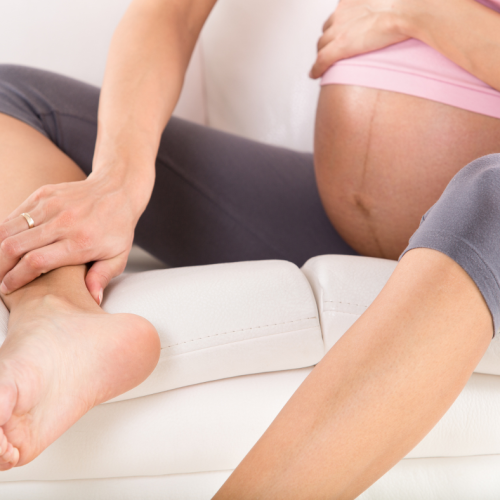Swollen Feet during Pregnancy
Many women experience swollen feet during pregnancy. Swelling is common during this time because the body retains extra fluid to protect and support the growing fetus.
Causes of swollen feet during pregnancy
Swelling in certain parts of the body is a normal part of pregnancy. This often occurs because the body produces extra fluid to support fetal growth. In addition, blood flow slows down, which can increase fluid build-up.
Swelling of the feet occurs most often in the later stages of pregnancy, especially in the third trimester. This is because the fetus is larger and puts more pressure on the legs and feet.

Symptoms of swollen feet during pregnancy
In women who experience swollen feet during pregnancy, the swelling typically:
- Appears gradually
- Is worse in hot weather
- Appears worse by the end of the day
- Lessens when they lie down or raise the feet
- Is equal in both feet
Treatment for swollen feet during pregnancy
Treatment at A7 Health with a physiotherapist may include:
- Heat therapy
- Mobility exercises on any stiff joints to increase range of motion
- Massage to relieve pain, increase blood flow and reduce swelling
Tips for self-treatment include:
- Stay off your feet – Avoid standing for long periods of time. If you can, put your feet up and occasionally turn your ankles and flex your feet slightly to stretch your calf muscles. It is even better if you lie down and elevate your legs.
- Sleep on your left side – This takes pressure off the large vein that returns blood to the heart from the lower half of the body (inferior vena cava). It may also help if you elevate your legs slightly with pillows.
- Wear compression stockings – Your physiotherapist may recommend wearing supportive tights or stockings during the day.
- Be physically active every day – Take walks, ride a stationary bike or swim laps in a pool.
- Wear loose clothing – Tight clothing may restrict blood flow. Do not wear socks or stockings with tight cuffs at the ankles or calves.
Complications
Extreme or sudden swelling can sometimes be an indication of a health problem in pregnancy. Women should contact their doctor immediately if they notice a sudden or rapid increase in swelling. The 2 main serious complications are:
Preeclampsia
A sudden increase in swelling in the feet may be a sign of preeclampsia. Women may also notice a swollen or puffy face, swelling around the eyes, or sudden swelling in the hands.
If the swelling in the feet is extreme, pressing on the skin for a few seconds may leave an indentation. There may also be discoloration of the legs.
Preeclampsia is a health condition that can occur during pregnancy or after delivery. Preeclampsia causes very high blood pressure and organ problems in pregnant women.
Deep vein thrombosis
Uneven swelling in the feet or legs may indicate a blood clot called deep vein thrombosis (DVT).
Pregnant women and women who have given birth within the last 3 months are at higher risk for DVT than women who are not pregnant. This is because blood clots more easily during pregnancy to prevent excessive blood loss during labor and delivery.
The growing fetus also puts pressure on the legs, which can affect blood flow. Reduced mobility during pregnancy and in the recovery period after delivery can also decrease blood flow to the legs.
Treatment at A7 Health for Swollen Feet and Pain during Pregnancy:
Get Physiotherapy – Book an appointment with a Physiotherapist at A7 Health who assess you in a 45 minute consultation and provide treatment alongside a treatment plan to manage your pain and swelling. Some of the treatments include:
- Heat therapy.
- Mobility exercises on any stiff joints to increase range of motion.
- Massage to relieve pain, increase blood flow and reduce swelling.
Join an exercise class/session (with a Biokineticist) – Moderate exercise, such as walking, has been shown to help relieve feet swelling and other pain during pregnancy. Stretching can help relieve sore muscles. Join an exercise class led by an A7 Health Biokineticist who will teach you exercises that will strengthen and relax muscles and help you to reduce the likelihood of pain during your pregnancy. These exercises will also help you with delivery and recovery after you give birth.
